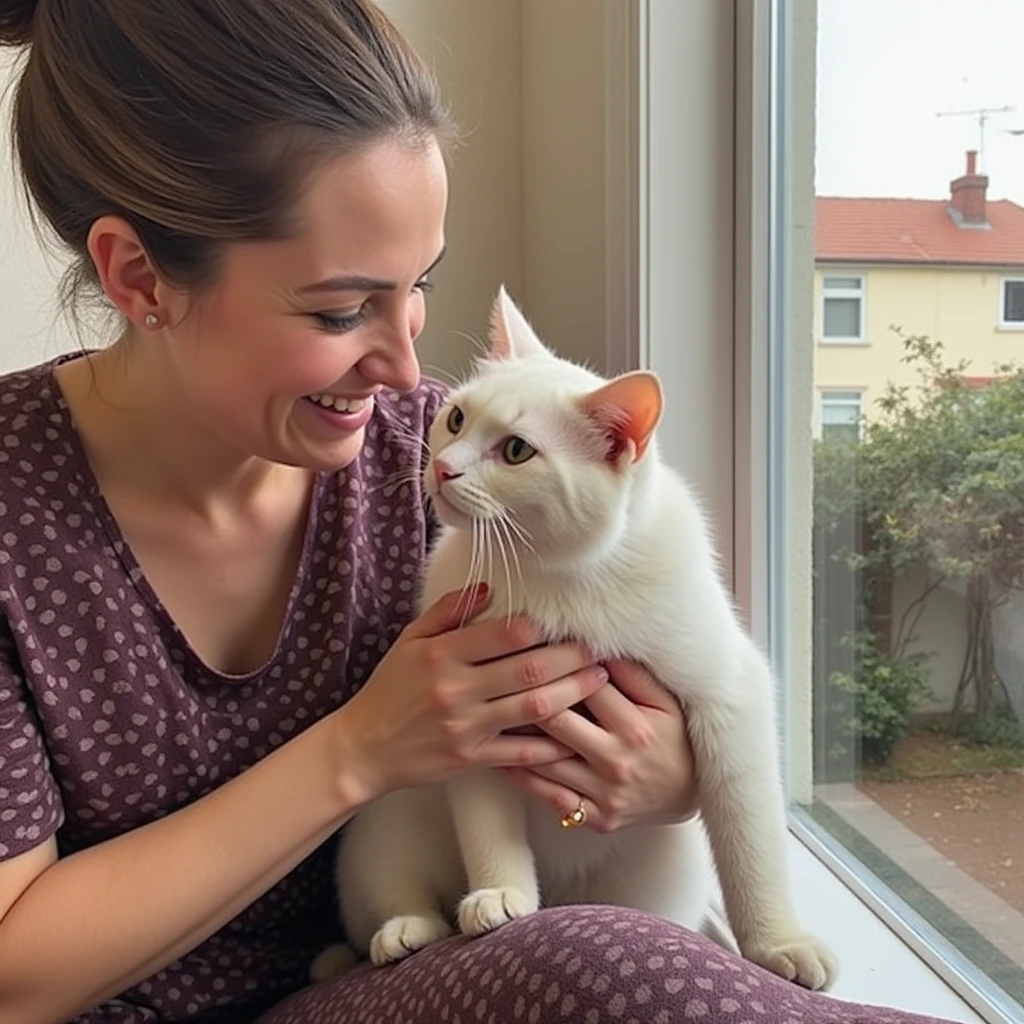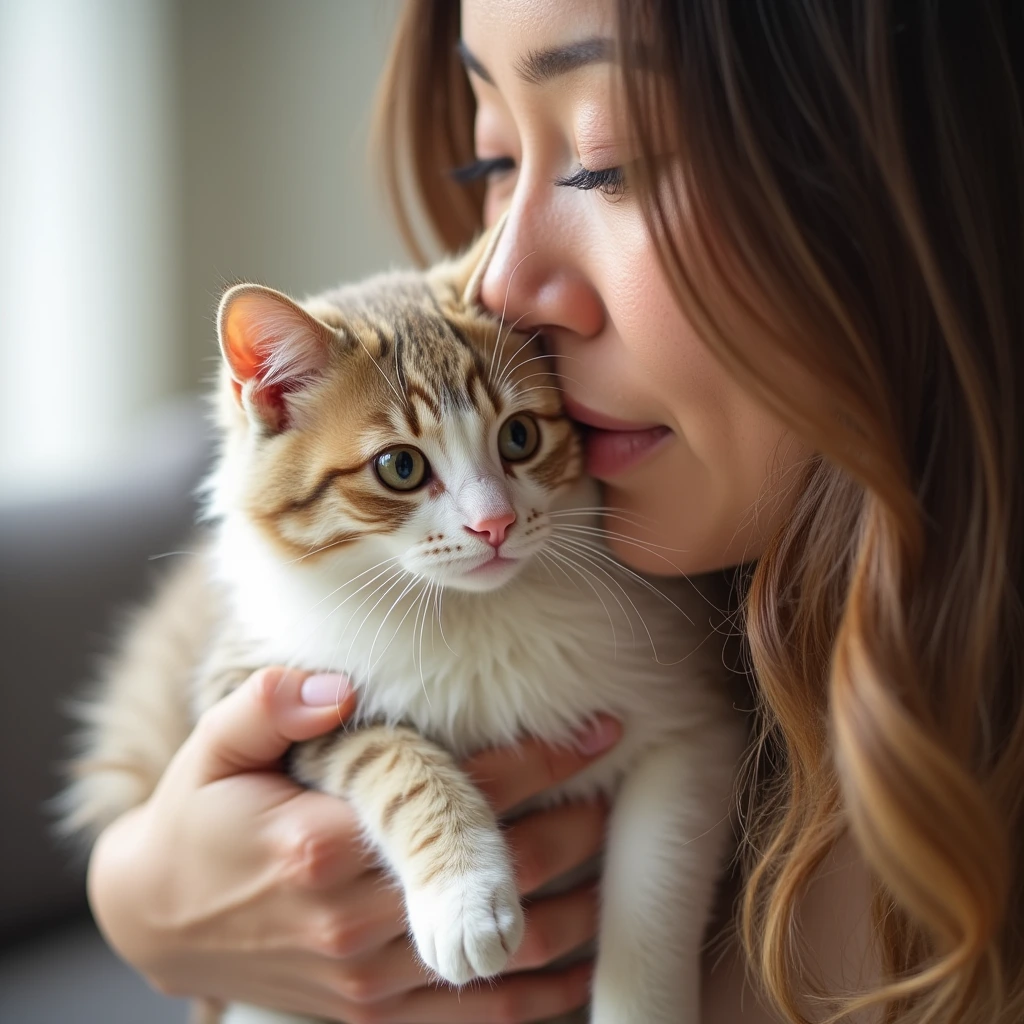Why would my cat pee on me Have you ever been shocked to find your cat peeing on you? It’s a puzzling and frustrating experience that can leave you wondering what went wrong. Cats are generally clean creatures, so when they suddenly urinate on their owners, it’s often a sign that something isn’t right. Understanding the reasons behind this behavior can help you address the issue and strengthen your bond with your feline friend.
In this article, you’ll explore 10 common reasons why your cat might pee on you and discover practical solutions to prevent future incidents. From health issues to behavioral triggers, we’ll cover it all. Plus, we’ll give you tips on how to build a stronger relationship with your furry friend.
Table of Contents

10 Common Reasons Why Your Cat Peed on You / why would my cat pee on me
1. Medical Issues
Cats may urinate in unusual places, including on their owners, if they are suffering from medical problems. This behavior can be a sign that your cat is in discomfort or pain.
Common Medical Conditions to Watch For
- Urinary tract infections (UTIs): A UTI can cause frequent urination and discomfort.
- Bladder stones: These can lead to blockage and painful urination.
- Kidney disease: This affects your cat’s ability to filter waste from the blood.
- Diabetes: Excessive thirst and urination are symptoms of feline diabetes.
Solution: If you notice your cat peeing on you or in unusual places, take them to the vet for a thorough check-up. Early detection can prevent more serious health issues.
2. Stress and Anxiety
Cats are sensitive creatures, and stress can trigger unusual behavior, including inappropriate urination. Your cat may feel overwhelmed or anxious due to changes in their environment.
Common Stress Triggers
- Changes in the home environment: Moving, redecorating, or introducing new furniture can unsettle your cat.
- New pets or people: A new addition to the household can make your cat feel threatened.
- Loud noises: Fireworks, thunderstorms, and construction noises can cause anxiety.
Solution: Identify and eliminate stressors where possible. Provide a calm, secure space for your cat to retreat to when they feel anxious.
3. Territorial Marking
Cats mark their territory by spraying, and in some cases, they might urinate on their owner to claim them as their own. This behavior is more common in unneutered cats.
Signs of Territorial Behavior
- Urinating on vertical surfaces
- Spraying near doors and windows
Solution: Neutering or spaying your cat can reduce territorial marking behavior. Additionally, using pheromone diffusers can help calm your cat.
4. Litter Box Issues
If your cat isn’t happy with their litter box, they may choose other places to relieve themselves. Ensuring that your cat’s litter box meets their preferences is essential.
Common Litter Box Problems
- Dirty litter box: Cats are clean animals and dislike using a dirty litter box.
- Wrong type of litter: Some cats have preferences for specific types of litter.
- Poor placement of the litter box: If it’s in a noisy or hard-to-access area, your cat might avoid it.
Solution: Keep the litter box clean, use a type of litter your cat prefers, and place the box in a quiet, accessible location.
5. Seeking Attention
Sometimes, cats pee on their owners as a way to get attention. If your cat feels neglected, they may resort to drastic measures to get you to notice them.
Signs Your Cat Wants Attention
- Excessive meowing
- Following you around
Solution: Spend more quality time with your cat. Engage in interactive play sessions and provide mental stimulation with toys and puzzles.
6. Separation Anxiety
Cats can develop separation anxiety, which may result in inappropriate urination when you’re away. This behavior can be distressing for both you and your cat.
Signs of Separation Anxiety
- Destructive behavior
- Overgrooming
Solution: Use calming aids such as pheromone diffusers or anxiety wraps. Consider hiring a pet sitter or using a pet camera to monitor your cat when you’re not home.
7. Behavioral Issues

In some cases, inappropriate urination is due to behavioral problems. Your cat might be bored or lack mental stimulation, leading to stress and unwanted behaviors.
Behavioral Triggers
- Boredom
- Lack of stimulation
Solution: Provide plenty of toys, scratching posts, and interactive activities to keep your cat mentally engaged.
8. Changes in Routine
Cats thrive on routine, and any changes can lead to stress and unusual behavior. They like predictability and may become anxious when their routine is disrupted.
Examples of Routine Changes
- Moving to a new home
- Altered feeding schedule
Solution: Stick to a consistent routine to help your cat feel secure. Gradually introduce changes to minimize stress.
9. Age-Related Issues
Older cats may have trouble controlling their bladder due to age-related conditions. These issues can make it difficult for them to reach the litter box in time.
Common Age-Related Problems
- Arthritis: Joint pain can make it hard for your cat to get into the litter box.
- Cognitive dysfunction: Older cats may experience confusion and forget where the litter box is.
Solution: Make accommodations for your senior cat, such as providing easier access to litter boxes and using low-sided litter boxes.
10. Scent Confusion
Cats rely heavily on scent, and they may pee on you if they’re confused by unfamiliar smells. This behavior is more likely if you’ve been around other animals.
Common Scent Triggers
- New perfumes or cleaning products
- Smells from other animals
Solution: Avoid introducing strong, unfamiliar scents into your cat’s environment. Wash your clothes if you’ve been around other animals to prevent scent confusion.
Pros and Cons of Understanding Why Your Cat Peed on You
Pros why would my cat pee on me
- Helps strengthen your bond with your cat
- Prevents future incidents
- Addresses underlying health or behavioral issues
Cons why would my cat pee on me
- May require time and patience to identify the root cause
- Can be emotionally stressful for the owner
Why Is Your Cat Peeing on the Bed? why would my cat pee on me
If your cat is peeing on your bed, it can be both confusing and frustrating. This behavior is usually a sign that something is bothering your cat, whether physically or emotionally. Cats may urinate on beds due to medical issues, such as urinary tract infections, bladder stones, or kidney problems. Stress and anxiety are also common triggers, especially if there have been recent changes in your home, like moving furniture, introducing new pets, or altering daily routines.
Another possibility is that your cat is marking their territory, especially if they feel insecure or threatened. To address this issue, start by visiting the vet to rule out health problems. Then, consider making the litter box more appealing by keeping it clean and placing it in a quiet, easily accessible spot. Creating a calming environment and maintaining a consistent routine can also help your cat feel more secure and reduce inappropriate urination.
Why Is Your Cat Urinating Outside the Litter Box? why would my cat pee on me
When your cat starts urinating outside the litter box, it’s a clear sign that something is wrong. Cats are naturally clean animals, so this behavior often points to underlying issues that need attention. One of the most common causes is a medical problem, such as a urinary tract infection, kidney disease, or diabetes.
Cats may also avoid their litter box due to discomfort, like a dirty box, an unsuitable type of litter, or an inconvenient location. Stress and anxiety can also play a major role, especially if there have been recent changes in your cat’s environment. To solve this issue, start by ruling out any medical conditions with a vet visit. Next, make sure the litter box is clean, appropriately sized, and placed in a quiet area. By addressing both health and environmental factors, you can help your cat feel comfortable using the litter box again.
Why Is Your Cat Peeing Everywhere? why would my cat pee on me
When your cat starts peeing everywhere, it’s a clear cry for help. This behavior is often linked to medical, emotional, or environmental factors that are causing distress. Medical conditions like urinary tract infections, bladder stones, or kidney disease can make it difficult for your cat to control their bladder, leading to accidents all over your home. Stress and anxiety are also key contributors — cats may pee in different spots to cope with changes in their environment, like a move, new pets, or unfamiliar people.
Additionally, territorial marking can cause cats to urinate in various places, especially if they feel insecure. To address this issue, start by taking your cat to the vet to rule out any health problems. Once medical issues are ruled out, focus on creating a calm environment, ensuring the litter box is clean and accessible, and giving your cat plenty of attention to reduce anxiety.
Why Is Your Kitten Peeing on the Bed? why would my cat pee on me
If your kitten is peeing on the bed, it’s often a sign that they’re still learning proper bathroom habits or feeling insecure in their new environment. Young kittens are still adjusting to using the litter box, and accidents can happen if the box is too far away, too dirty, or difficult to access. Additionally, kittens might pee on soft surfaces like beds because they find them comforting, especially if they feel anxious or overwhelmed.
The scent of your bed may also make them feel close to you, prompting them to mark it. To prevent this, ensure the litter box is always clean, easily accessible, and placed in a quiet area. Positive reinforcement, like giving treats when they use the box, can help your kitten build good habits. With patience and consistency, you can guide your kitten to use the litter box correctly and avoid future accidents.
FAQ Section why would my cat pee on me

Why would my cat pee on me while I’m sleeping?
This could be due to separation anxiety or your cat marking their territory. Addressing anxiety and providing a comfortable space can help.
Can stress cause a cat to pee on their owner?
Yes, stress is a common trigger for inappropriate urination in cats. Identifying and eliminating stressors is key to preventing this behavior.
How do I stop my cat from peeing on me?
First, rule out any medical issues by visiting a vet. Then address potential behavioral causes such as stress, litter box problems, and attention-seeking behavior.
Is it normal for a cat to pee on their owner?
While it’s not typical behavior, it can happen for various reasons such as medical issues, stress, or territorial marking. Understanding the cause can help prevent future occurrences.
Conclusion why would my cat pee on me
Finding out why your cat peed on you can be challenging, but it’s important to approach the issue with patience and understanding. By identifying the root cause—whether it’s medical, behavioral, or environmental—you can take steps to address the problem and prevent it from happening again. Remember, your cat isn’t acting out of spite; they’re trying to communicate something. Listening to your cat’s needs will help strengthen your bond and create a happier, healthier environment for both of you.
Visit MeowRealm for more tips on understanding your cat’s behavior. Don’t forget to share this article to help fellow cat owners!
why would my cat pee on me

